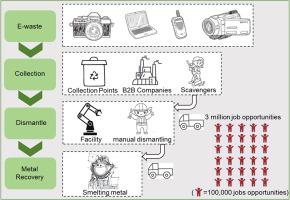Waste Management ( IF 8.1 ) Pub Date : 2021-02-06 , DOI: 10.1016/j.wasman.2021.01.023 Wan-Dong Yang , Qing Sun , Hong-Gang Ni

|
The e-waste problem needs be tackled under a global framework, based upon the understanding that e-waste is a global issue and thus a shared responsibility. To illustrate this point, a cost-benefit analysis of metal recovery from e-waste was conducted with Europe, North America and China as representative regions of e-waste producers. The final profit associated with the entire e-waste recycling process was estimated by deducing the energy costs of metal recovery from the revenues of the manually dismantling stage and the metal recovery stage. Then, the potential job opportunities were estimated based on the final profit from the local e-waste recycling and average wage per year. Overall, profits of manually dismantling 1 ton of e-waste varied widely, but the final profits were positive. The potential job opportunities generated by local e-waste recycling ranged from 4.65 × 105 person/year for North America to 2.03 × 106 for China person/year. According to our study, the environmental load of 1 kg of e-waste would be 1–9 USD, indicating that this is the cost required to offset the environmental consequences of each kilogram of e-waste. By applying environmental load to per capita, the concept can act as a tool to encourage countries to fairly share the environmental responsibility of e-waste based on their e-waste generation. Based on this, we propose an e-waste emissions trading system that set a cap on the total amount of e-waste that could be generated globally and per country, to reduce e-waste and carbon emissions.



























 京公网安备 11010802027423号
京公网安备 11010802027423号